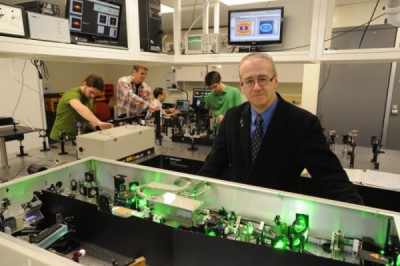Nouvelles
Work by Professor Michel Meunier's team is among Québec Science magazine's top 10 discoveries of 2012
Each year, Québec Science magazine selects 10 top scientific discoveries submitted by universities, research centres and other institutions. The jury's attention was captured by the light scalpel that can make a nanometric incision in the surface of a human cell and attack tumours.
The unique method developed by Professor Michel Meunier and his team uses a laser with super-short pulses, along with gold nanoparticles. Deposited on the cells, these nanoparticles concentrate the laser's energy and make it possible to perform nanometric-scale surgery in an extremely precise and non-invasive fashion. Among other things, the technique allows surgeons to change the expression of genes in the cancer cells and could be used to slow their migration and prevent the formation of metastases. It is the only laser that can make incisions in the membrane of several cells simultaneously.

The technique perfected by Professor Meunier and his colleagues is a promising alternative to conventional methods of cellular transfection, such as lipofection. The experiment, carried out in Montréal laboratories on malignant human melanoma cells, demonstrated 70% optoperforation effectiveness, as well as a transfection performance three times higher than lipofection treatment. In addition, unlike conventional treatment, which destroys the physical integrity of the cells, the new method assures cellular viability, with a toxicity of less than 1%. The impact of this research work is not limited solely to cancer cells. The technology could be used to treat illnesses of the heart and retina.
The entire Polytechnique community is encouraged to VOTE for the discovery of the year on the Québec Science website.
Our heartiest congratulations to Professor Meunier and his team!
On the Web:
To read about Professor Meunier's expertise
Article published in
Québec
Science magazine on Professor Meunier's work
Article on the Université de Montréal website: Québec Science : la moitié des découvertes de l'année faites
par des chercheurs de l'UdeM et de Polytechnique



